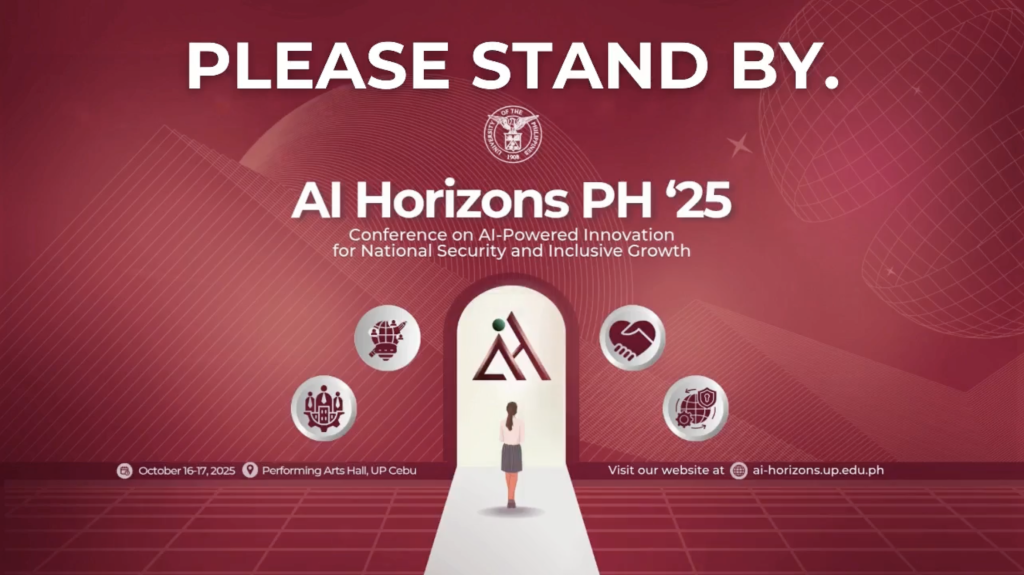PRESS RELEASE
Philippines confronts $4.8 Trillion AI opportunity, as UP launches two-day conference addressing urgent need for AI strategy following devastating earthquakes
22 October 2025 | AI Horizons PH 2025

CEBU CITY — The University of the Philippines hosted AI Horizons PH on October 16–17, 2025, at UP Cebu, convening more than 300 leaders and innovators from academia, industry, government, and civil society.
Building on the momentum of last year’s inaugural conference — which drew over 200 participants and sparked collaborative initiatives in agriculture, education, health, and governance — this year’s expanded program tackled four critical sectors: cybersecurity and national security; business process outsourcing and creative industries; disaster risk reduction; and social good and inclusive growth.
As the global AI market accelerates towards $4.38 trillion, AI Horizons PH’25 aims to contribute to the national AI strategy and position the Philippines at the forefront of the digital revolution. The two-day conference featured over 20 technical presentations, real-world case studies, and live demonstrations of AI solutions designed specifically for Philippine challenges and opportunities, bringing together policymakers from government agencies; industry leaders from major BPO companies and technology firms; and international experts from development organizations such as the Asian Development Bank and the Korea Legislation Research Institute.
The conference gains heightened urgency following two devastating earthquakes on September 30 that claimed 75 lives in Cebu and displaced over 669,000 residents; ten days later, a magnitude 7.4 earthquake off Davao brought further casualties and triggered tsunami warnings. These recent events underscore the importance of AI technologies presented at the conference — systems designed to enhance earthquake prediction, strengthen early warning capabilities, and improve emergency response coordination. Such innovations represent critical tools in the ongoing efforts to better prepare communities for when disaster strikes.

“The task before us is to ensure that our technologies serve the public good, that innovation and ethics grow hand in hand, and that the Philippines stands not as a passive observer of the AI revolution, but as a thoughtful and principled leader in it,” stated Professor Prospero C. Naval Jr., AI Horizons PH ’25 Program Committee Chair.
This conference addressed both imperatives: how AI can be leveraged to address both national development and security — areas critical to the nation’s resilience, disaster preparedness, and future.
Protecting Digital Philippines and Critical Infrastructure
The cybersecurity and national security sessions respond to the United Nations’ call for AI capacity-building in developing countries, as market concentration threatens to widen the global technology divide. A small group of corporations, predominantly from the US and China, control 40% of global AI R&D spending, according to the 2025 report by the UN Conference on Trade and Development (UNCTAD). With leading tech giants, the concentration of AI expertise and infrastructure risks leaving developing nations dependent on foreign technology for critical response systems like cybersecurity, national security, and disaster response.
“At a time when AI nationalism is rising and nations are racing for technological supremacy, we assert our sovereignty by building not only powerful systems but just and inclusive ones that uplift generations of Filipinos,” said President Angelo Jimenez, as the country stands at a pivotal crossroads in the age of AI.

This challenge resonates with UNCTAD’s urgent call to action. “UNCTAD’s message is clear: the time to act is now,” emphasized Professor Gisela P. Concepcion, Program Committee member and UP Professor Emeritus. “Without immediate investment in AI infrastructure, data governance, and workforce training, the Philippines risks being left behind—not just technologically, but economically and in our capacity to protect citizens from disasters.”
The AI Horizons conference highlights how local tech capabilities can protect digital infrastructures. Department of Science and Technology Region VI Director Engr. Rowen R. Gelonga discussed the artificial intelligence development strategies and action plan in the regions. This plenary directly addresses UNCTAD’s identification of “infrastructure” as one of three key leverage points for successful AI adoption, alongside data and skills.
Some of the presented AI solutions are threat detection for government and corporate networks, disinformation countermeasures to protect democratic institutions, and maritime security applications for archipelagic defence. In the broader sense, the afternoon sessions examine governance frameworks for AI in national security contexts, including policymaking and portable AI deployment for rapid response in critical situations.
The timing proves particularly relevant as earthquakes in Cebu and Davao cause widespread power outages, damage critical infrastructure, and disrupt government operations. These events demonstrate how physical disasters create cybersecurity vulnerabilities and the potential to use AI systems that can maintain security and operations even during crises.
AI and the Philippine Economy: Adapting for the Future
The Philippine BPO industry employs about 1.7 million Filipinos and contributes $31.6 billion annually, yet faces automation pressures with AI advancement.
The UNCTAD report reveals that reskilling and upskilling with AI are essential in competing in this new technological era. AI-driven automation often benefits capital over labor — reducing the competitive advantage of developing economies’ low-cost labor — and 118 countries remain absent from global AI governance discussions.
“The recent earthquakes revealed vulnerabilities in our digital infrastructure that supports 200,000 BPO workers in Cebu alone,” explained Dr. Joel Joseph S. Marciano, UP VP for Research Innovation and Program Committee member. “Day 1 programming demonstrates how AI can strengthen both cybersecurity defenses and physical infrastructure resilience.”

The Philippine BPO industry must evolve from basic services to AI-enhanced solutions. Companies now seek partners for complex, AI-integrated processes such as predictive analytics, intelligent automation, and AI-assisted decision support, rather than routine tasks machines can handle. Salvador Villasis of the Cebu IT-BPM Organization explores this shift in the plenary session titled: “How Artificial Intelligence will transform the IT/BPM Industry.”
AI’s transformation extends beyond technology services to creative sectors once considered immune to automation. Atty. Jocel Isidro S. Dilag of the Cebu Furniture Industries Foundation examined in her talk how creative sectors must adapt to these changing times.
To empower Filipinos in this age of AI, where UNCTAD reports that up to 40% of jobs could be affected by AI automation, upskilling initiatives must teach workers to harness AI as a tool to reach their full potential. Dr. Drandreb Earl Juanico brought up this approach for competing in English-speaking industries in his talk “AI-DUB: Automated Accent Adaptation for Filipino English as Second Language Speakers in the Global Voice Industry.”
These talks were presented in the plenary session “AI in BPO and Creative Industries” on Day 2 of the conference. Michelle Alarcon, President of the Analytics & AI Association of the Philippines, delivered the keynote speech for this plenary.
Social Good & Disaster Preparedness
Two interconnected tracks at the conference demonstrate how AI can serve communities during both crisis and everyday life — addressing immediate disaster response needs while building long-term capacity in healthcare, education, and governance.
Recent earthquakes in Cebu and Davao — resulting in ₱3 billion infrastructure damage and power outages affecting 819,843 consumers and disrupting over 12,000 schools across Mindanao and Visayas — reflect the broader looming earthquake threats faced by the communities. These disruptions, from halting education to straining emergency response capacity, demonstrate how disasters exacerbate existing vulnerabilities and further delay development.
The disaster risk reduction sessions examined geospatial AI for local governance, exploring how mapping and spatial analysis can support community-level decision-making and resource allocation. Presentations on portable, scalable AI frameworks highlight technologies designed for rapid field deployment during emergencies, while a session on building AI literacy among legal professionals addresses the regulatory capacity needed to govern emerging technologies responsibly.
Complementing these discussions, the social good track showcased how AI applications in everyday sectors strengthen community resilience during crises.
Dr. Johanna Cañal, Professor at UP Philippine General Hospital and one of the speakers at last year’s AI Horizons’ Health and Wellness session, shared about developments in AI and Radiology research over the past year: “There’s so much we can do in radiology. We have digital X-rays, CT scans, and MRIs, so the potential is there. At PGH, we do about 35,000 CT scans a year — that’s so much data. Can you imagine the number of data points we have and all the potential research we can do?”
Discussions on AI-powered radiology and healthcare are essential when medical facilities face surge capacity during disasters. On the other hand, sessions on responsible AI integration offered practical frameworks for schools and universities adopting these tools. The program included presentations on AI implementation in process engineering and industrial robotics, concluding with an analysis of AI investment trends across Asia—providing context on how different regions are approaching technology adoption to support inclusive economic development.
These use cases and applications demonstrate that building resilient communities requires both responsive governance systems and equitable access to beneficial technologies.

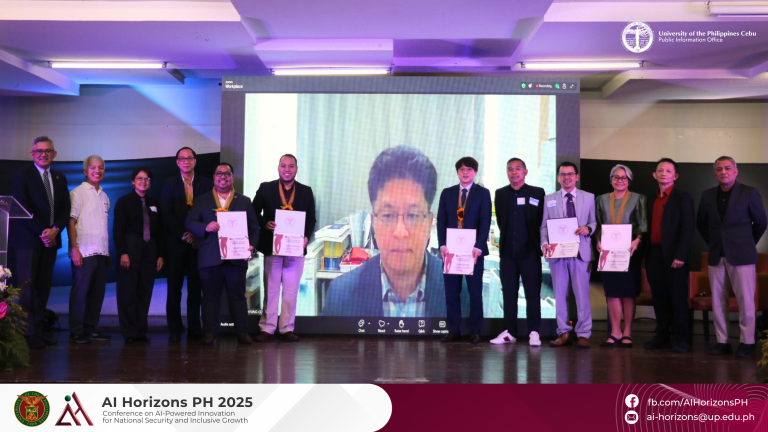
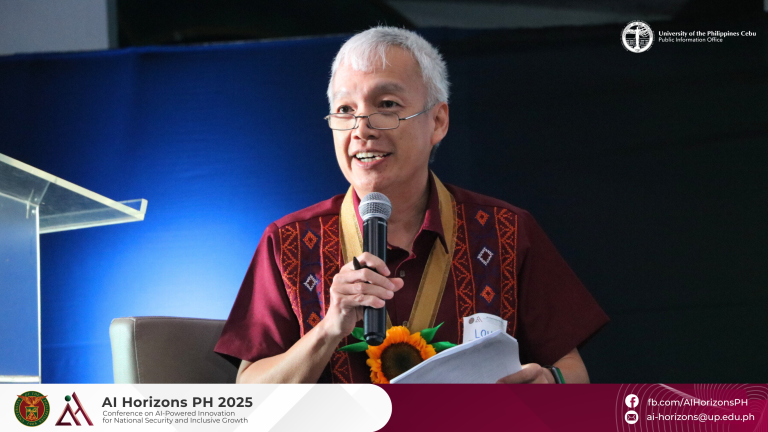

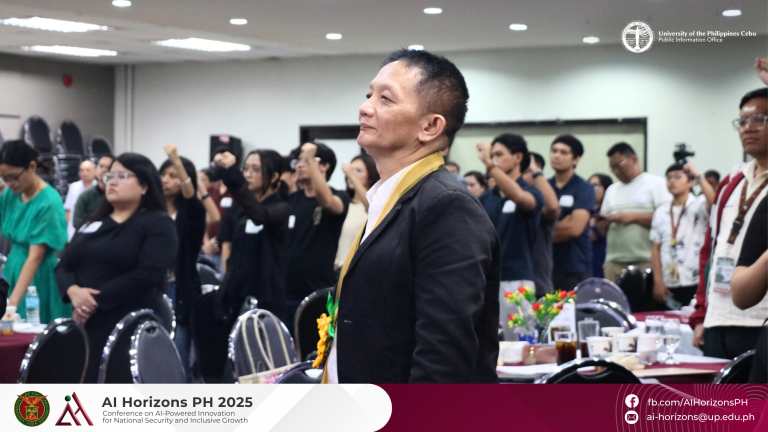

Concrete Outputs for National Development
The choice of Cebu as the conference venue carries both symbolic and strategic weight. As the leading BPO hub outside Metro Manila, Cebu embodies the government’s Digital Cities 2025 program — a decentralization strategy spreading technology benefits nationwide, rather than concentrating them in the capital.
The recent earthquake’s impact on Cebu — and the broader vulnerabilities facing communities across the Philippine archipelago — adds immediacy to discussions on how AI tools can strengthen existing disaster preparedness frameworks alongside community resilience and institutional capacity.
“AI must be our new instrument of nation-building, a tool not of domination but of liberation. We must build AI systems that serve the poor and not replace them,” said Chancellor Atty. Leo Malagar, UP Cebu Chancellor. “AI that empowers us teachers, not erases them. AI that uplifts farmers, not exploits them. AI that strengthens democracy, not manipulates it. And let it be AI that reaches the peripheries, not just one that feeds the center.”
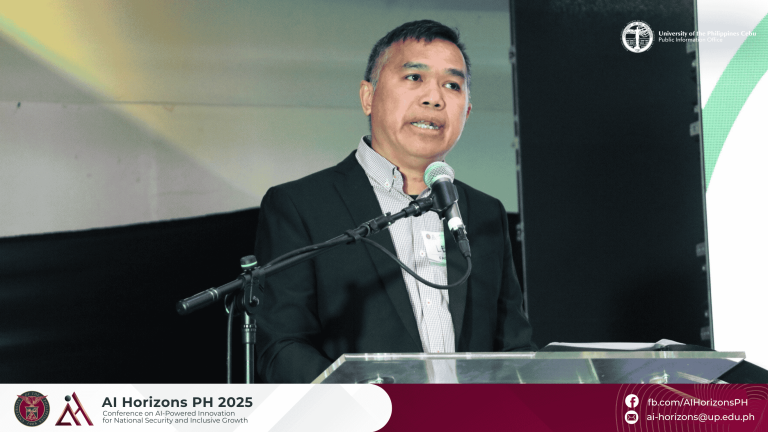
The final pillar of UNCTAD’s framework is data governance — addressing data sovereignty, cross-border flows, and regulatory structures for responsible AI deployment. “Inclusive governance” with representation of all stakeholders, and “international cooperation” provide a level playing field. The conference will translate these into sector-specific strategies through the following outputs:
- A policy brief on the National AI Cybersecurity Strategy policy for government agencies
- AI Integration in the Philippine BPO Sector industry roadmap — for major industry players and government agencies shaping workforce development policies
- Philippine Priorities for AI Social Good multi-stakeholder framework — for development organizations, NGOs, and government agencies working on poverty reduction and social inclusion
“We need to treat our data as the national asset it is, not the resource to be extracted by others. And we need to train our people not merely to use AI but to create it, to interrogate it, to direct it toward ends we collectively choose,” emphasized President Jimenez. Moving forward, these outputs represent the conference’s commitment to translating strategic vision and plenary sessions into actionable frameworks that position the Philippines to actively shape AI’s role in national development and disaster resilience.
For accreditation and interview requests, contact [email protected].
Contact Information:
- Conference Website: https://ai-horizons.up.edu.ph
- Facebook: https://facebook.com/AIHorizonsPH
- Email: [email protected]
- Program Committee Chair: Professor Prospero C. Naval Jr. ([email protected])
Share Via

